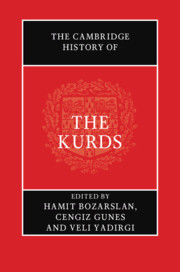Book contents
- The Cambridge History of the Kurds
- The Cambridge History of the Kurds
- Copyright page
- Contents
- Figures
- Maps
- Tables
- Contributors
- Acknowledgements
- Abbreviations
- Additional material
- Introduction
- Part I Historical Legacies
- Part II Regional Political Developments and the Kurds in the Twentieth and Twenty-First Centuries
- Part III Domestic Political Developments and the Kurds in the Twentieth and Twenty-First Centuries
- Part IV Religion and Society
- Part V Kurdish Language
- Part VI Art, Culture and Literature
- Part VII Transversal Dynamics
- Index
- References
Introduction
The Kurds and the Kurdish Question in the Middle East
Published online by Cambridge University Press: 13 April 2021
- The Cambridge History of the Kurds
- The Cambridge History of the Kurds
- Copyright page
- Contents
- Figures
- Maps
- Tables
- Contributors
- Acknowledgements
- Abbreviations
- Additional material
- Introduction
- Part I Historical Legacies
- Part II Regional Political Developments and the Kurds in the Twentieth and Twenty-First Centuries
- Part III Domestic Political Developments and the Kurds in the Twentieth and Twenty-First Centuries
- Part IV Religion and Society
- Part V Kurdish Language
- Part VI Art, Culture and Literature
- Part VII Transversal Dynamics
- Index
- References
Summary
In the past decade, the Kurdish question has re-established itself at the heart of the regional political debates at a time when the Middle East is once again engulfed in conflict and violence. On numerous occasions during the second half of the twentieth century, Kurdish nationalism has managed to generate and maintain strong appeal amongst Kurdish populations in Iraq, Iran, Turkey and Syria, but these states have perceived Kurdish ambitions as a threat to their national security and regional stability. At the beginning of the twenty-first century, Kurdish political activism has reached a new height with Kurdish movements in Iraq, Turkey and Syria establishing themselves as important political actors in the domestic politics of these states. The consolidation of Kurdish autonomy in Iraq in 2005 and the establishment of a Kurdish de facto autonomous region within Syria in 2012 have turned the Kurds into actors capable of influencing regional political developments, and consequently enabled them to forge stronger relations with the international forces involved in the region.
- Type
- Chapter
- Information
- The Cambridge History of the Kurds , pp. 1 - 22Publisher: Cambridge University PressPrint publication year: 2021
References
- 2
- Cited by

